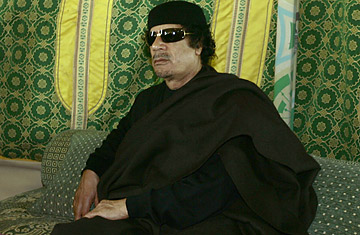
Libyan leader Muammar Gaddafi
It took Libyan leader Muammar Gaddafi just six days in his new job as chairman of the African Union to outrage the continent. Addressing journalists at the end of an African Union summit in the Ethiopian capital, Addis Ababa, the new A.U. chief opined, "Coups are fine so long as they are staged peacefully. Coups and rebellions are spontaneous events that cannot be controlled." Just for good measure, Gaddafi (who seized power in Libya as a young military officer in 1969) added that Africa's tribalism meant democracy could not work and then excused piracy off Somalia as "self-defense." He also revived his plan to create a "United States of Africa." African reaction was swift and unfavorable. "Under Gaddafi, Africa Could Explode," concluded a headline in the Nation, one of Kenya's main national newspapers. "Gaddafi Election Is Last Nail in Africa's Coffin," wrote Uganda's Daily Monitor. Good thing, then, that the rotating leadership of the A.U. is a largely symbolic position. (See pictures of Ethiopia's hunger crisis.)
Gaddafi's image in the West may have been shaped by the Lockerbie bombing and U.S. President Ronald Reagan's branding him the "mad dog of the Middle East." But there's more to the controversial Libyan leader than one-dimensional demonization allows. Gaddafi overthrew Libyan King Idris I in 1969 as a 27-year-old colonel, eventually instituting his system of Jamahiriya (State of the Masses), in which Libya would be governed by local councils with no formal role for Gaddafi. In reality, of course, his informal position as Brotherly Leader and Guide of the Revolution translated into absolute power. A secular, left-leaning pan-Arabist rather than a jihadist, Gaddafi offered training and financial aid to a plethora of militant groups and figures, some of whom were responsible for headline-grabbing hijackings and other terrorist events, while others, like Liberia's Charles Taylor and Sierra Leone's Foday Sankoh, wreaked havoc and mass murder during rampages through West Africa. (See pictures of Africa under water.)
More recently, Gaddafi has courted a rapprochement with the West, reaching a settlement over the 1988 bombing of a Pan Am 747 over Lockerbie, Scotland, paying $2.7 billion to the families of the 270 victims and renouncing his ambitions to obtain a nuclear weapon. The Libyan leader is, by anyone's measure, his own man, and he draws condemnation and admiration in equal parts in Africa and the Middle East for his willingness to offend the consensus.
For that alone, Gaddafi deserves to be heard. His idea of a United States of Africa may be far-fetched, given the poor governance and outright conflict that blights many of Africa's far smaller nation-states. But few would have believed at the end of World War II that Europe would converge in a union within a quarter-century — and Gaddafi has started the ball rolling with the formation of an African Union Authority, supposedly with executive powers, to replace the current A.U. Commission. (A.U. foreign ministers are meant to meet within three months to work out plans for a transition to the new leadership structure.) In a continent still often held hostage to the double-talk that accompanies tyranny and corruption, Gaddafi's frankness can also be refreshing.
He offended many with his dismissal of African democracy: "We do not have political structures. Our system is social," he explained. "There will be tribal parties. The system that is being tried in Africa has not been successful." But there's some truth in that assessment, as anyone who experienced Kenya's general-election riots a year ago can attest. Similarly with Gaddafi's assessment of the piracy off the coast of Somalia — "It is not piracy. It is self-defense, and it is defending Somali children's food. It is a response to greedy Western nations who invade and exploit Somalia's resources illegally." Western and Asian fishing fleets have long taken advantage of Somalia's lack of law to plunder its seas and use them as a dumping place for toxic waste, causing immense resentment among Somali fishermen who claim to have turned to piracy to protect their waters and extract compensation from a world that has marginalized them. (Of course, Gaddafi seems to forget that the collapse of the Somali state was brought about by the Somalis themselves.) (See pictures of modern-day pirates.)
Gaddafi has made a career out of giving offense, and for many he will never be anything more than a bloodstained terrorist. Still, his efforts to breathe life into one of the world's more useless regional groupings, mired as it is in pompous inertia and unaccountability, will make his year in charge of the African Union worth watching.
